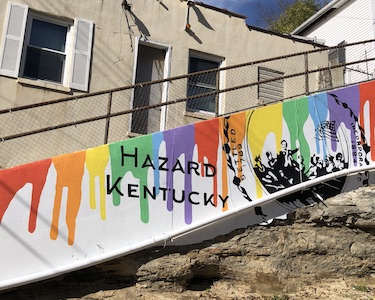Our Church’s Expression of the Gospel Through Community

For me, answering the question, “What is the church’s mission?” feels something like trying to describe to someone what soda is. Soda (or ‘pop’) is simply a sweetened carbonated beverage. It could contain real sugar or artificial sweetener. It could have enough caffeine to keep you up ‘til you’re done with that Saturday-night sermon, or it could be caffeine-free. It could be made with grape, orange, lemon, lime, citrus, ginger – you name it. You can make your own flavors with at-home soda makers; just add a sweetened product to the carbon dioxide mixture, and you have yourself soda! At its core soda is just a sweetened carbonated beverage, but each flavor has its own unique characteristics.
The same is true with the Church and its mission. It doesn’t matter whether a church is Presbyterian, Lutheran, Methodist, Episcopalian, Baptist, Roman Catholic, Orthodox, etc., the heart of the Church’s mission is always the same: to be a witness to the Gospel of Jesus Christ to the world. Every congregation and faith community should be doing this; if not, its members would do well to question what type of gathering it actually is.
___________________________________________
Will this approach to mission cause our membership double overnight? No, but I’m not convinced that is what matters.
___________________________________________
Jesus Christ calls the Church Universal to be a witness to his love, grace, mercy, forgiveness, and peace throughout the entire the world. However, the way that each particular church fulfills and lives out its mission can be, and quite honestly should be, unique to its physical and social locations. The living proclamation of the Gospel will manifest itself differently in the farmlands of Kentucky than it will in a major metropolis, yet the essence remains the same. Like soda, the Church’s mission comes in many different flavors.
 Permit me to use the example of the church where I serve as a pastor, the First Presbyterian Church in (historic) Kensington, a neighborhood of Philadelphia, PA. The church is located in a neighborhood formally known these days as Fishtown. Over the past 15 years and continuing, Fishtown has gone through a transformation of gentrification. Members of the ‘millennial’ generation are purchasing homes and moving in; a dozen hip, new, urban restaurants have opened (with plans for more); and almost every block is undergoing some type of construction on it. Not surprisingly, housing prices have skyrocketed during this time.
Permit me to use the example of the church where I serve as a pastor, the First Presbyterian Church in (historic) Kensington, a neighborhood of Philadelphia, PA. The church is located in a neighborhood formally known these days as Fishtown. Over the past 15 years and continuing, Fishtown has gone through a transformation of gentrification. Members of the ‘millennial’ generation are purchasing homes and moving in; a dozen hip, new, urban restaurants have opened (with plans for more); and almost every block is undergoing some type of construction on it. Not surprisingly, housing prices have skyrocketed during this time.
In the midst of such substantial change and growth in the community, tensions have developed between the long-time residents and newer occupants. This has escalated to the point where it is rare to see a cross-mixture of the two groups. The long-time residents, whose family have lived in Fishtown for generations, are less likely to go to the new restaurants opening, while new residents are less likely to grab a pizza from the local shop that has been there for generations, opting instead for a newer pizza place just voted ‘Best pizza in America’ (I’ll leave that argument up for debate).
___________________________________________
The living proclamation of the Gospel will manifest itself differently in the farmlands of Kentucky than it will in a major metropolis, yet the essence remains the same.
___________________________________________
Fishtown is an exciting neighborhood in which to live and serve, but it’s also a challenging one. How does the church fulfill its mission to be a witness to the Gospel in such a locale? Does it focus strictly on the new community members and gear more of its programming and focus towards the arts? Or, does it downplay the emerging arts scene and focus on more traditional ministry opportunities that tend to appeal older generations and long-time residents? The approach that First Church Kensington has taken is the more difficult of the options presented, but I firmly believe that it is the most faithful to the community and to the Gospel. We’ve chosen to reach out and engage in ministry with both groups simultaneously.

Photo: Public Domain
When members of the church and I were interviewed in preparation for our bicentennial programs in the spring of 2014, we were asked, among other things, what the Church in general has left to offer society. You have to admit, it’s a good question. The Church was at one time the crux of the social services offered in a community; if you needed help of any kind, the first place to look was the local church. Over the past few decades, as non-profits providing just about any type of service one could need have come onto the scene, the Church is no longer the place people go first, or even the first to come to mind.
Certainly, the Church is still called to be a witness to the Gospel of Jesus Christ to the world. And social services have been and remain one means – one flavor – of that of witness. But today, those particular services of the Church, those flavors, are no longer unique offerings to society. So – what does the church have left to offer?
___________________________________________
What does the Church have left to offer society?
___________________________________________
Community. The Church is a place where people from all walks of life join together for a common purpose, to express their faith, to worship God, and to join forces in work for the greater good. The Church is one of very few places in society where you can find a young millennial sitting next to a retired World War II veteran, where deep friendships can be formed across lines of ethnic background, race, or theological perspective (Believe it or not, not all Christians have to agree on everything!). The Church is a unique location where inter-generational ministry can still, and does, take place.

This is how the First Presbyterian Church in Kensington is fulfilling its mission, by being a prominent location in Fishtown where both long-time residents and newer residents can come together and feel safe, welcomed, and loved. Perhaps a family has lived around the corner for 40 years, but no one has ever set foot in this or any church before. Maybe a newer resident has had doubts about religion in general but curious and wants to check out what this church is all about. As far as our congregation is concerned, none of that matters. And we do our very best to make that clear to all people in our neighborhood.
Will this approach to mission cause our membership double overnight? No, but I’m not convinced that is what matters. Most days, I wish the conversation around church membership and its importance would be thrown out the window. The Church’s mission has nothing to do with increasing membership. If that were the case, then the Church would conduct its business like any other membership rewards club or store credit card; we could congratulate ourselves on a ‘sell’ every time someone walks through our doors.
___________________________________________
We need to spend less time worrying about who we’re losing and more time asking the question, “Are we getting it right?”
___________________________________________
 No, we need to stop caring so much about our per capita and how much the church is declining in membership, and focus our efforts on the church’s mission. Spend less time worrying about who we’re losing and more time asking the question, “Are we getting it right?” We are not called to popularity (in fact, Jesus had some things to say about how the world might view the Church…); we are called to faithfulness.
No, we need to stop caring so much about our per capita and how much the church is declining in membership, and focus our efforts on the church’s mission. Spend less time worrying about who we’re losing and more time asking the question, “Are we getting it right?” We are not called to popularity (in fact, Jesus had some things to say about how the world might view the Church…); we are called to faithfulness.
It’s time we stopped focusing on programs with the intent of pleasing a certain crowd or drawing the ‘young’ people into our congregations. Rather, each church should be faithful to its calling from Christ and fulfill its mission in the most authentic way it can, however that may look in its location. Each day, we are tasked with the responsibility of discerning how we are being called to be a witness to the Gospel of Jesus Christ. That, my friends, is the mission of the Church.
*****
AUTHOR BIO: Shawn Hyska currently serves as the Teaching Elder and pastor of First Presbyterian Church in Kensington (Philadelphia, PA). He is a native Philadelphian and majored in accounting before obtaining his M.Div. from Princeton Theological Seminary. In addition to serving the church, Shawn is a financial consultant, working primarily with non-profit organizations.
Read more articles in this issue: What Mission is This Anyway?





Unbound Social